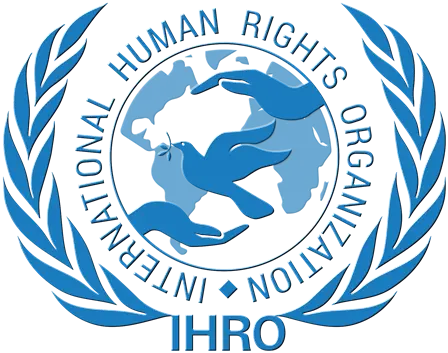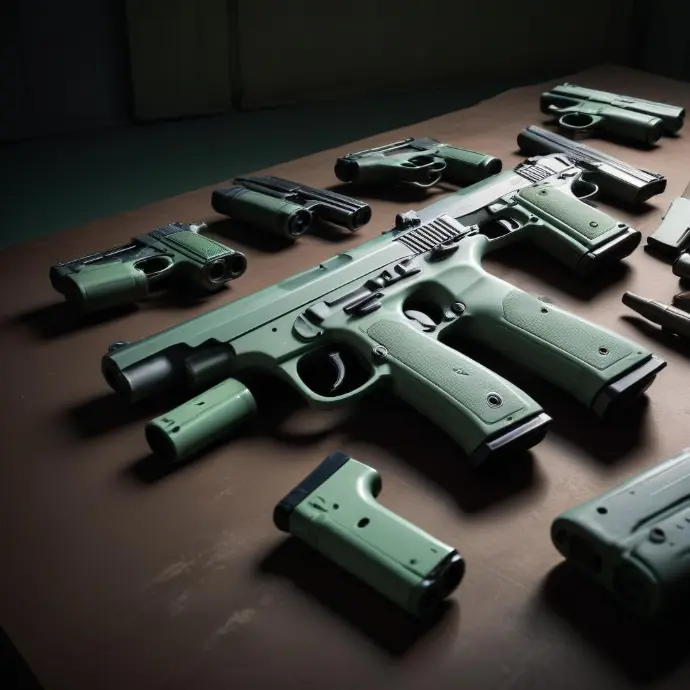Arms Trafficking and Its Direct Relationship with Human Rights Violations
On our website, we delve into the deepest aspects of global human rights, addressing complex and urgent issues. This time, we'll explore the shocking link between arms trafficking and human rights violations in our feature article, "Arms Trafficking and Its Direct Relationship with Human Rights Violations." Prepare to discover the direct connection between this crucial issue and armed conflicts. We assure you it will keep you intrigued and eager to learn more!
Introduction
Arms trafficking is one of the most serious global problems, with direct impacts on human rights violations. Throughout this article, we will explore in depth the relationship between arms trafficking and human rights violations, as well as the current context of this problem worldwide.
Arms trafficking refers to the illegal arms trade, including the unauthorized manufacture, transportation, sale, and possession of firearms, ammunition, and explosives. This illegal trade fuels armed conflict, contributes to interpersonal violence, and has a devastating impact on the security and stability of communities worldwide.
Arms trafficking not only involves the illegal international transfer of arms but also encompasses the clandestine circulation of arms within countries, which significantly aggravates the incidence of violent crime and weakens governance.
It is important to emphasize that arms trafficking is not limited to the illegal exchange of weapons but also involves activities such as document forgery, smuggling, and the corruption of law enforcement officials, making its detection and prevention even more difficult.
The relationship between arms trafficking and human rights violations is undeniable. Easy access to firearms through illegal trafficking directly contributes to an increase in armed violence, homicides, gender-based violence, and armed conflict. This, in turn, leads to massive violations of human rights, including the right to life, security, and personal integrity.
Furthermore, arms trafficking facilitates the recruitment of child soldiers, the forced displacement of populations, the commission of war crimes, and the perpetuation of protracted armed conflicts, all of which have a devastating impact on the lives and dignity of those affected.
Therefore, addressing the relationship between arms trafficking and human rights violations is crucial to promoting peace, security, and respect for human dignity worldwide.
Nuestra empresa se especializa en consultoría, desarrollo de productos y soporte al cliente. Adaptamos nuestros servicios para satisfacer las necesidades únicas de empresas en varios sectores para ayudarles a crecer y tener éxito en un mercado competitivo.
Furthermore, the illegal arms trade thrives in conflict and post-conflict environments, where weapons are used as tools to perpetuate violence and consolidate power. This context has led to a significant increase in demand for arms, which in turn fuels a thriving and dangerous black market.
Addressing arms trafficking globally requires a comprehensive approach that involves international cooperation, the effective implementation of arms control measures, the prevention of smuggling, and strengthening the capacity of States to effectively regulate and monitor the arms trade.
Arms trafficking and its impact on human rights
The trafficking of illegal arms is closely linked to a significant increase in human rights violations worldwide. This illicit trade provides criminal groups and non-state actors with the means to commit atrocities, including extrajudicial killings, kidnappings, and acts of terrorism. Furthermore, unrestricted access to firearms facilitates the commission of violent crimes, perpetuating a cycle of violence that affects entire communities.
The proliferation of illegal weapons also contributes to state repression, as corrupt and authoritarian governments use these arsenals to intimidate, oppress, and silence civilians. This results in the violation of fundamental rights, such as freedom of expression, peaceful assembly, and political participation, which in turn undermines democracy and the rule of law in various nations.
Arms trafficking not only fuels violence but also fuels government oppression and the systematic violation of human rights around the world.
Illegal arms trafficking has serious humanitarian consequences, as it perpetuates armed conflicts and civil wars, which in turn results in a significant increase in the loss of life, forced displacement of civilians, and the widespread destruction of communities. These weapons often end up in the hands of armed groups that perpetuate indiscriminate violence, causing immense suffering to the civilian population.
Furthermore, the uncontrolled flow of illegal arms hampers humanitarian and development efforts by destabilizing entire regions, making it difficult to deliver lifesaving assistance to affected populations. The presence of illegal arms also increases the risk to humanitarian workers and undermines the ability of international organizations to provide aid in dangerous environments.
Ultimately, illegal arms trafficking not only perpetuates violence but also hampers humanitarian and development efforts, resulting in unnecessary suffering for millions of people around the world.
The trafficking of illegal arms is closely linked to the exacerbation and prolongation of armed conflicts in various regions of the world. These illicit weapons fuel and perpetuate armed conflicts, providing belligerents with the means to continue fighting, which in turn results in a significant increase in civilian casualties and further destruction of infrastructure and resources.
Furthermore, the trafficking of illegal arms undermines efforts at peaceful conflict resolution, as it provides conflicting groups with the ability to reject peace processes and continue violent confrontation. This dynamic unnecessarily prolongs human suffering, impedes reconciliation, and hinders sustainable development in the affected regions.
The trafficking of illegal arms not only fuels armed conflicts but also hinders peace and reconciliation efforts, resulting in continued human suffering in areas affected by armed violence.
Arms trafficking is a complex phenomenon involving a variety of actors, both state and non-state, who contribute to its proliferation and misuse. State actors, such as governments and armed forces, are often involved in the production, sale, and transfer of arms, whether legally or illegally. In some cases, corruption within state structures facilitates the diversion of arms to illegal networks, fueling armed conflicts and human rights violations.
On the other hand, non-state actors, such as rebel groups, criminal organizations, and terrorist networks, play a significant role in illicit arms trafficking. These actors often obtain arms through illegal channels, taking advantage of gaps in arms regulation and control to stock up and strengthen their military power. Arms trafficking is often associated with the commission of crimes against humanity, including murder, forced displacement, recruitment of child soldiers, and widespread violence against civilians.
The complex interaction between state and non-state actors in arms trafficking underscores the need for a comprehensive and collaborative approach to addressing this problem. International cooperation, strengthening arms control mechanisms, and holding perpetrators accountable are key elements to mitigating the devastating impact of arms trafficking on human rights globally.
International Regulations and Legislation on Arms Trafficking
Arms trafficking is a global problem that requires strong international regulations for its prevention and control. Several international treaties and conventions seek to regulate the arms trade and reduce its impact on human rights. One of the most important treaties is the Arms Trade Treaty (ATT), which seeks to establish international standards to regulate the trade in conventional arms and prevent their diversion to illicit uses, including the commission of human rights violations. Likewise, the United Nations Convention against Transnational Organized Crime and its Protocol against the Illicit Manufacturing of and Trafficking in Firearms, their Parts, Components, and Ammunition also play a crucial role in the fight against arms trafficking internationally.
These international treaties and conventions provide a legal framework for cooperation among countries in the prevention, control, and punishment of illicit arms trafficking, establishing common standards to regulate the arms trade and strengthening international cooperation in the fight against this problem.
It is essential that countries ratify and comply with these treaties and conventions, as well as implement effective measures to prevent arms trafficking, in order to protect human rights and promote global security.
National legislation plays a crucial role in preventing illegal arms trafficking and protecting human rights. Countries must have strong legal frameworks regulating the manufacture, trade, possession, and transit of arms, as well as effective control and oversight mechanisms to prevent their diversion into illicit activities.
Furthermore, it is essential that countries establish proportional and dissuasive penalties for those involved in illicit arms trafficking, as well as for those who use arms to commit human rights violations. The effective implementation of these national laws contributes significantly to the prevention of arms trafficking and the protection of human rights in each country.
International cooperation in the implementation and enforcement of national legislation is equally important, as arms trafficking is a problem that transcends national borders and requires globally coordinated efforts for its prevention and control.
Responses and actions to combat arms trafficking and protect human rights
International cooperation is essential to addressing arms trafficking and its impacts on human rights globally. International agreements and treaties, such as the Arms Trade Treaty (ATT) and the United Nations Convention against Transnational Organized Crime, play a crucial role in regulating and coordinating efforts between countries. These instruments seek to prevent the illicit transfer of arms, strengthen border controls, and promote transparency in the conventional arms trade.
Furthermore, collaboration between international agencies, law enforcement agencies, and non-governmental organizations is essential to track and dismantle arms trafficking networks. Intelligence sharing and operational coordination are key elements in the fight against this scourge, as arms trafficking networks often operate across multiple jurisdictions.
International cooperation also involves supporting countries affected by arms trafficking, providing them with technical assistance and training to strengthen their control and prevention capacities. This comprehensive collaboration is essential to effectively address illicit arms trafficking and protect human rights worldwide.
Legal repercussions and sanctions against illegal arms trafficking are crucial elements in combating this phenomenon and protecting human rights. Countries must strengthen their legal frameworks to effectively criminalize and penalize illicit arms trafficking, as well as participation in criminal networks related to this crime.
Furthermore, it is essential to have international judicial cooperation mechanisms that facilitate the extradition and prosecution of those responsible for arms trafficking across borders. Likewise, financial and trade sanctions against individuals and entities involved in illegal arms trafficking are important tools to deter and punish these illicit activities.
The effective implementation of these legal measures and sanctions contributes to dismantling arms trafficking networks, reducing their impact on human rights, and promoting accountability for those who perpetuate these violations.
Preventing arms trafficking and human rights violations faces a series of challenges and obstacles that require comprehensive and coordinated responses at the national and international levels. Among the most significant challenges are porous borders, corruption, the black market for arms, lack of control over the sale and transfer of arms, and the involvement of non-state armed groups in illicit arms-related activities.
Furthermore, the proliferation of small arms and light weapons, as well as increasingly sophisticated technology for arms manufacturing and trafficking, pose additional challenges in preventing this phenomenon. The lack of resources and capacities in many countries to implement effective controls and monitor the arms trade is also a significant obstacle.
Addressing these challenges requires a comprehensive approach that includes preventive measures, enhanced international cooperation, national capacity building, disarmament, demobilization, and reintegration, as well as the strengthening of global regulatory and arms control frameworks.
The fight against arms trafficking and its impact on human rights requires the implementation of effective preventive actions and measures at the global level. One of the fundamental actions is strengthening international cooperation to combat arms smuggling. This involves information sharing and collaboration between countries to track and dismantle arms trafficking networks, as well as implementing stricter control measures at borders and ports.
Furthermore, it is crucial to promote transparency in the arms trade and strengthen the regulation and monitoring of arms transfers. This includes the adoption of robust international treaties that establish clear standards for the sale and transfer of arms, as well as the verification of final recipients to prevent diversion and misuse.
Another important measure is the promotion of disarmament and arms control programs, as well as support for development initiatives that address the underlying causes of armed conflict and violence. These programs may include the collection and destruction of illegal weapons, as well as the implementation of community development projects that promote security and peaceful conflict resolution.
Responses and actions to combat arms trafficking and protect human rights
Arms trafficking continues to have a devastating impact on human rights globally. Illicit weapons fuel armed conflicts, contribute to the proliferation of organized crime, and undermine the stability of nations. This illegal arms trade has led to countless human rights violations, including the forced displacement of people, the loss of innocent lives, and the perpetuation of violence in vulnerable communities.
Furthermore, arms trafficking facilitates the rise of gender-based violence, as illegal weapons are often used to perpetrate acts of violence against women and girls. This situation highlights the urgent need to address the illicit flow of arms globally to comprehensively protect human rights.
It is essential that the international community recognize and address the serious threat that arms trafficking poses to human rights worldwide and that effective measures be taken to prevent and combat this problem.
The importance of international cooperation and the effective implementation of regulations in the fight against arms trafficking cannot be underestimated. Coordinated action among countries is required to establish and enforce strict regulations governing the manufacture, transfer, and possession of arms. Furthermore, it is crucial to promote transparency in the arms trade and strengthen control mechanisms to prevent their diversion into illegal hands.
The effective implementation of regulations also requires collaboration between authorities, civil society, and the private sector to ensure that the measures adopted are truly effective. Only through strong international cooperation and a joint commitment can arms trafficking and its impacts on human rights be comprehensively addressed.
It is essential that States strengthen their efforts to prevent the illicit flow of arms by implementing stricter regulations and strengthening international cooperation mechanisms.
Future challenges related to arms trafficking and its impact on human rights require concerted action at the global level. It is essential to address deficiencies in the implementation of regulations and strengthen monitoring and control mechanisms to prevent the illicit flow of arms.
Furthermore, it is necessary to adopt comprehensive approaches that address the underlying causes of arms trafficking, such as poverty, inequality, and the lack of economic, social, and educational opportunities in certain regions. These factors contribute to the proliferation of armed violence and its negative impact on human rights.
Collaboration between States, international organizations, civil society, and the private sector is essential to effectively address arms trafficking and its consequences for human rights globally. Only through concerted and sustained action can we move toward a safer world that respects the fundamental rights of all people.
Arms trafficking is a problem that continues today, fueling conflicts and violating human rights around the world.


 IHRO NEWS
IHRO NEWS

